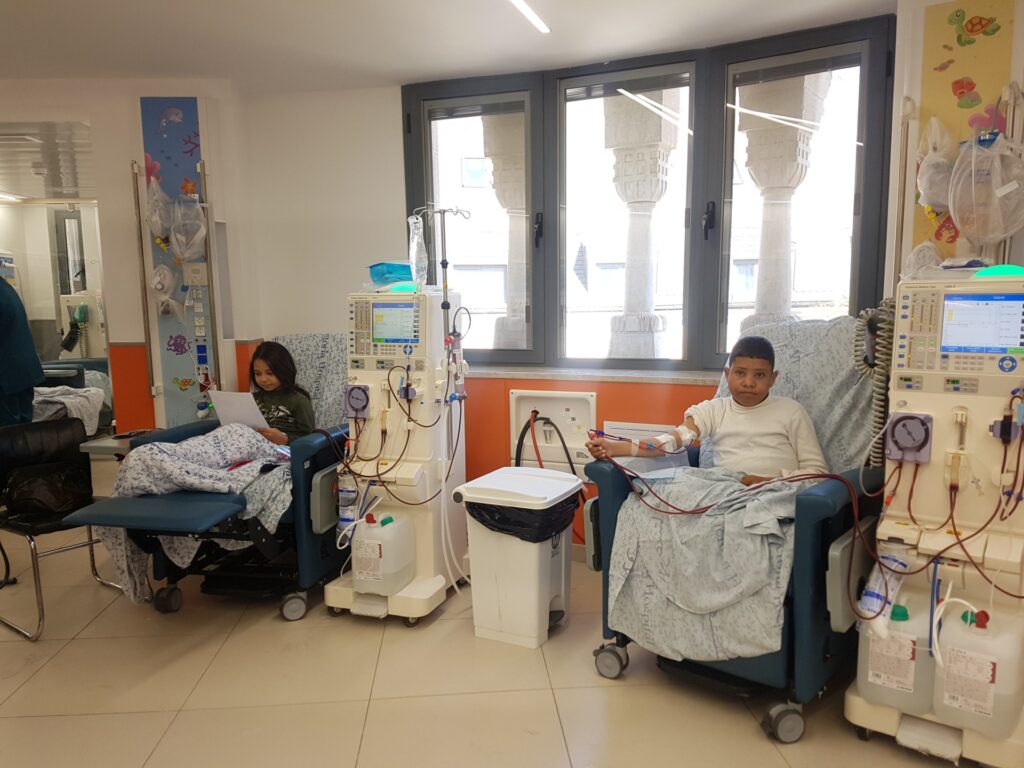Occupied Jerusalem- Before dawn, 50 children from all the governorates of the West Bank head towards Jerusalem to attend their dialysis sessions, which range from 3 to 4 sessions per week.
In the dialysis hall, children are distributed on machines that purify their bodies of accumulated toxins, but their faces are pale because of the long road they take, with dozens of additional military checkpoints erected between villages and cities in the West Bank since the beginning of the war on Gaza, on the seventh of last October. In addition to those that surround the city of Jerusalem.
Tel Aviv Tribune Net met a child who preferred to use his first name, “Hassan,” who comes from the city of Dura in the south of the West Bank, and who has been receiving treatment for kidney failure for years at Augusta Victoria Hospital (Al-Mutala’) in Jerusalem. Despite his exhausted features, this child does not hesitate to respond to greetings with a broad, smiling smile. About optimism despite the difficulties.
In a few words, Hassan described his travels, saying that the road had become exhausting after the outbreak of the last war, and that access was no longer easy due to the many barriers.
Despite the obstacles, these children and their families cannot fail to attend dialysis sessions due to the complications that the resident pediatrician at Al-Mutalaa Hospital, Saeed Salama, spoke to Al-Jazeera Net.
Serious complications
“If the patient misses the dialysis session, complications appear immediately due to the high level of toxins in the body because dialysis works in place of the malfunctioning kidneys… Missing the dialysis sessions leads to convulsions, and the toxins accumulated in the body affect the brain, which sometimes leads to its damage and then to death.”
Salama adds that for some children, interrupting the washing session causes the percentage of fluids in the body to rise and sometimes reach the lungs, which leads to cessation of breathing and death. Some children are also exposed to weakness in the heart muscle. This is what doctors faced at the beginning of the war, as they were unable to attend their routine sessions.
Salama says: “We are now treating children suffering from heart failure because at the beginning of the war they suddenly stopped dialysis sessions and fluids accumulated around the heart.”
The doctor adds that the children in question also face, in some cases, the problem of a sharp drop in calcium in the body, which leads to the emergence of the problem of osteoporosis and the child’s inability to walk due to interruption in sessions sometimes.
The harm was not limited to kidney failure patients, especially children, most of whom are treated at Al-Mutalaa Hospital in Jerusalem, but also affected cancer patients, especially those who need radiotherapy, which is not available in the West Bank and Gaza Strip.

Discontinuation of Gaza patients
Regarding cancer patients, the Executive Director of Al-Mutalaa Hospital and Head of the Radiation Oncology Department at the hospital, Fadi Al-Atrash, spoke, saying that since the beginning of the war until now, the arrival of 738 invasive cancer patients who were supposed to complete their treatment journey at the hospital has failed, including 42 patients whose radiation treatment plans were ready and awaiting their arrival.
He added that the problem does not lie in a patient missing a single radiation session due to his inability to arrive due to military checkpoints, but rather the most serious problem lies in his not receiving radiotherapy at all due to the war, like the patients in Gaza.
Since the seventh of last October, no Gazan patient has arrived at Al-Mutalaa Hospital, which is considered the primary destination for these patients to be treated for various and complex tumors, to receive chemotherapy, radiation, and biological treatment, and to undergo various surgeries at Al-Maqasid Hospital in Jerusalem as well.
Regarding the repercussions of this on the health of patients, Doctor Fadi Al-Atrash said that this directly affects the results of treatment and the chances of surviving the disease and controlling it, thus giving the patient a better quality of life.
Regarding what the Gazan patients who have been cut off from treatment are facing now, Al-Atrash confirmed that they are inevitably experiencing a relapse and progression of the disease in light of the disruption of the treatment plan and the failure to complete the radiation, chemotherapy, and biological treatment sessions in the hospital.
Security ban
According to data from the Palestinian Ministry of Health, about two thousand Gazans are diagnosed with various cancer diseases annually, and these constitute 40% of the patients of Al-Mutalaa Hospital in Jerusalem, in addition to 60% who arrive at the hospital from the various governorates of the West Bank.
Regarding whether some patients were prevented from starting or completing their treatment in Jerusalem due to the “security ban” imposed by the Israeli security services, Al-Atrash pointed out that this dilemma existed before the war and continued after it, but issuing the “security ban” decision became easier after the war.
This ban is not limited to patients referred for treatment in Jerusalem alone, but also applies to some employees of the six East Jerusalem hospitals, of which West Bank residents constitute between 70 and 80% of the total employees.

